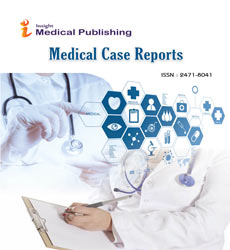Explains How Different People's Lives are Affected by COVID-19
Ahmet Mesut*
Department of Maternity and Gynecological Nursing, Cukurova University, Adana, Turkey
- *Corresponding Author:
- Ahmet Mesut
Department of Maternity and Gynecological Nursing,
Cukurova University, Adana,
Turkey,
E-mail: Mesut_a@cu.edu.tr
Received date: February 27, 2023, Manuscript No. IPMCRS-23-16611; Editor assigned date: March 01, 2023, PreQC No. IPMCRS -22-16611 (PQ); Reviewed date: March 10, 2023, QC No. IPMCRS-22-16611; Revised date: March 21, 2023, Manuscript No. IPMCRS-22-16611 (R); Published date: March 28, 2023, DOI: 10.36648/2471-8041.9.3.284
Citation: Mesut A (2023) Explains How Different People's Lives are Affected by COVID-19. Med Case Rep Vol.9 No.3:284.
Introduction
Coronavirus and its implications ignited fears, stresses, and nerves across the globe. Thailand eased some travel restrictions in preparation for a return to normalcy after months of severe restrictions. The Thai government imposed stringent protection measures, including mandatory 14-day quarantine at designated quarantine hotels, to prevent the spread of COVID-19 from overseas. Hotels have been used as quarantine or isolation facilities by governments in numerous nations. The term "quarantine hotels" refers to these hotels that are temporarily altered. Additionally, strict global quarantine measures necessitate the isolation of numerous individuals from their immediate families. When it comes to meeting the requirement for temporary housing during quarantine, quarantine hotels have proven to be a viable option. Nonetheless, facilitating quarantine visitors can influence the physical and mental prosperity of isolation lodging bleeding edge representatives, as they face a higher gamble of contamination.
Isolation Lodgings
Because of the Coronavirus flare-up, the pressure and tension of accommodation representatives, currently perceived to be more noteworthy contrasted with different businesses because of the long enemy of social working hours and successive association with clients might be additionally exacerbated. Frontline workers in quarantine hotels, like those in health care, come into direct contact with guests, which mean they are more likely to breathe in respiratory droplets. These representatives not just experience an expanded responsibility because of new working methodology and disinfection conventions in isolation lodgings, yet additionally emotional well-being issues like sadness, tension, and stress. If experienced for an extended period of time, high levels of stress and anxiety can have a negative impact on mental health. Accordingly, anxiety toward Coronavirus is enhanced among cutting edge workers in the friendliness business, especially those utilized in isolation lodgings. This perception is upheld by the examination, which gave an account of the feeling of dread toward reaching individuals who might be tainted by Coronavirus. Furthermore, during the pandemic flare-up, people experienced "infobesity," or an over-burden of data. People became overly concerned about the consequences of the virus, which affected their mental health and resulted in decreased quality of life, psychological distress, depression, and anxiety. This was caused by the widespread coverage of the pandemic outbreak in the media and the fact that the infection was known to be lethal. According to previous and more recent studies, infectious disease pandemics and epidemics can be extremely distressing for some people, even leading to post-traumatic stress disorder and persistent psychological distress. An individual's emotional wellness assumes a significant part in their prosperity and is totally imperative for carrying on with a useful and fulfilling existence. In the working environment, emotional well-being issues are related with a large number of negative results, like low proficiency, drops in efficiency, and expanded nonappearance. In a number of conceptual works, COVID-19 has been linked to mental health issues like agitation, anxiety disorders, depression, insomnia, and anger among hospitality workers. As a result, Sigala has called for more empirical research into the question of whether hospitality workers have mental health issues because they are afraid of COVID-19 as a primary stressor. Thus, the main role of this exploration is to lead an experimental examination concerning whether the apprehension about Coronavirus impacts the emotional wellbeing of isolation lodging representatives. Worldwide, the COVID-19 pandemic has had a significant and unprecedented impact on mental health. Quarantine lodging representatives not just persevered through gigantic disturbances while offering support to isolation visitors during compulsory quarantine periods, yet in addition encountered the high mental pressure that accompanies the gamble of openness and virus of themselves, their companions, and their families. This study examined the effect of the anxiety toward Coronavirus on psychological well-being issues. Self-compassion and psychological resilience's moderating roles were also investigated. 360 employees from thirteen Thailand-based "Alternative State Quarantine" hotels were surveyed for the data. The outcomes proposed that anxiety toward Coronavirus decidedly affected emotional well-being issues. The negative effects of COVID-19 fear on mental health were mitigated by self-compassion and psychological resilience at work. This threeway conversation demonstrated that employees who had high resilience and self-compassion performed better. The hypothetical and commonsense ramifications for neighborliness chiefs are examined.
Mental Health Problems
Since employee responses to the psychological distress caused by traumatizing experiences, such as the COVID-19 pandemic, may vary, it is of the utmost importance to investigate the factors that can buffer the effect of the fear of COVID-19 on mental health problems, given the adverse effects of mental health issues on workplace outcomes. Standard examination has archived that representatives' very own assets, like mental flexibility and self-sympathy, can assist with combatting pressure and tension. Psychological resilience is the capacity to adapt to life's challenging or problematic circumstances and to thrive in times of fear and uncertainty. People who have a high resilience recover from trauma more quickly than people who have a low resilience. However, there is a significant lack of research on the psychological resilience's role as a buffer during the pandemic. As a result, the present investigation sought to determine whether psychological resilience played a moderating role in the positive association between COVID-19 anxiety and mental health issues. In addition, a growing interest in the concept of self-compassion has resulted from a trend that combines Western psychological approaches with Buddhist concepts like "mindfulness." Regardless of its long history in religion, medication, and social science, the investigation of sympathy in associations is moderately new. Self-empathy is characterized as "a warm, kind and non-critical disposition to oneself during misfortunes" and has shown a positive relationship with prosperity and psychological wellness. As well as empowering close to home guideline, self-empathy can support unfavorable emotional wellness results because of distressing encounters, maladaptive convictions, and pessimistic self-related comprehensions. As a result, we anticipate that self-compassion will mitigate the positive correlation between employees of the quarantine hotel's fear of COVID-19 and mental health issues. The study's overall objective is to investigate how employees of quarantine hotels’ mental health are affected by their fear of COVID-19.

Open Access Journals
- Aquaculture & Veterinary Science
- Chemistry & Chemical Sciences
- Clinical Sciences
- Engineering
- General Science
- Genetics & Molecular Biology
- Health Care & Nursing
- Immunology & Microbiology
- Materials Science
- Mathematics & Physics
- Medical Sciences
- Neurology & Psychiatry
- Oncology & Cancer Science
- Pharmaceutical Sciences
